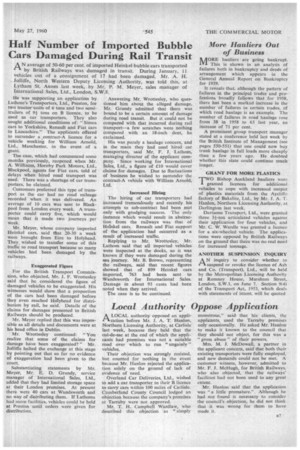Half Number of Imported Bubble Cars Damaged During Rail Transit
Page 41

If you've noticed an error in this article please click here to report it so we can fix it.
A N average of 50-60 per cent. of imported Heinkel bubble cars transported
by British Railways was damaged in transit. During January, 11 vehicles out of a consignment of 17 had been damaged. Mr. A. H. Jolliffe, North Western Deputy Licensing Authority, was told this, at Lytham St. Annes last week, by Mr. P. M. Meyer, sales manager of International Sales, Ltd., London, S.W.8.
He was supporting an application by Lathom's Transporters, Ltd., Preston, for two tractor units of 6 tons and two semitrailers of 91 tons on B licence, to be used as car transporters. They also sought additional conditions of: " Simca cars to Yorkshire, Renault and Fiat cars to Lancashire." The applicants offered to surrender a .contract-A licence for a vehicle working for William Arnold, Ltd., Manchester, in the event of a grant.
The case, which had commenced sonic months previously, reopened when Mr. A. Williams, Hornby Park Motors, Ltd., Blackpool, agents for Fiat cars, told of delays when hired road transport was used. There was a shortage of car transporters, he claimed.
Customers preferred this type of transport as the car had no road mileage recorded when it was delivered. An average of 10 cars was sent to Blackpool from London every week. A transporter could carry five, which would mean that it made two journeys per week.
Mr. Meyer, whose company imported Heinkel cars, said that 20-30 a week were brought from Eire to Holyhead. They, wished to transfer some of this traffic to road transport because so many vehicles had been damaged by the railways.
Exaggerated Figure For the British Transport Commission, who objected, Mr. I. F. Wrottesley said that he considered the figure of damaged vehicles to be exaggerated. His witnesses would show that a proportion of the cars had been damaged before they even reached Holyhead for distribution by rail, he said. Details of the claims for damages presented to British Railways should be produced.
Mr. Meyer replied that this was impossible as all details and documents were at his head office in Dublin.
Mr. Wrottesley continued: "You realize that some of the claims for damage have been exaggerated?" Mr. Jolliffe halted the exchange at this stage by pointing out that so far no evidence of exaggeration had been given to the court.
Substantiating statements by Mr. Meyer, Mr, E. D. Grundy, service manager of International Sales, Ltd., added that they had limited storage space at their London premises. At present there were 40 cars at Wandsworth and no way of distributing them. If Lathoms had more facilities, vehicles could be held at Preston until orders were given for distribution. Answering Mr. Wrottesley, who questioned him about the alleged damage, Mr. Grundy admitted that there was bound to be a certain amount of damage during road transit. But it could not be compared with that incurred during rail transport—a few scratches were nothing compared with an 18-inch dent, he exclaimed.
His was purely a haulage concern, and in the main they had used hired car transporters, said Mr. F. I. Lathom, managing director of the applicant company. Since working for International Sales, Ltd., a figure of would cover claims for damages. Due to fluctuations of business he wished to surrender the contract-A vehicle with William Arnold, Ltd.
Increased Hiring The hiring of car transporters had increased tremendously and recently his attempts to sub-contract had been met only with grudging success. The only instance which would result in abstraction from the railways was that of Heinkel cars. Renault and Fiat support of the application had occurred as a result of increased traffic.
Replying to Mr. Wrottesley, Mr. Lathom said that all imported vehicles were inspected at the docks, so it was known if they were damaged during the sea journey. Mr. B. Brown, representing the railways, said that recent figures showed that of 899 Heinkel cars imported, 763 had been sent to Wandsworth for International Sales. Damage in about 93 cases had been noted when they arrived.
The case is to be continued.
















































































































